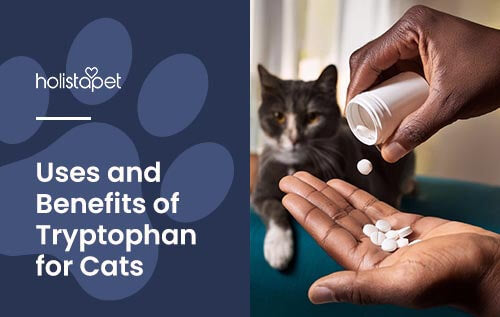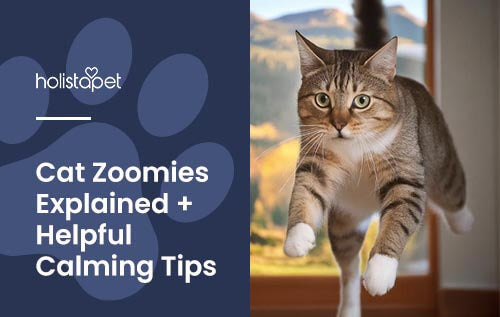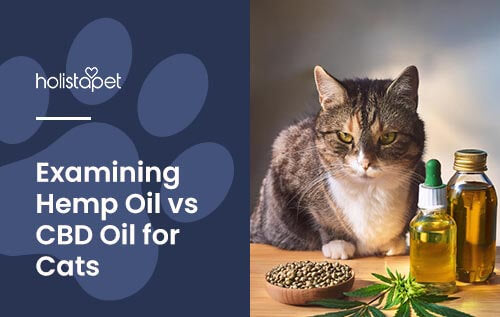Imagine a serene haven where your beloved cat can lounge peacefully without a care in the world. With tryptophan for cats, this dream can become a reality. The essential amino acid tryptophan helps kitty cats manage stressful situations, making them feel at ease every single day.
Are you hoping to bring calm and harmony to your skittish cat? In this article, we'll explore the many health benefits of tryptophan on our animal companions. We'll also discuss tryptophan supplementation and safety precautions, plus answer some of your frequently asked questions. Keep reading to learn how you can create a safe and tranquil sanctuary for your furry best friend using tryptophan.
What Is Tryptophan?
Tryptophan is an essential amino acid vital for various bodily functions, including protein synthesis and neurotransmitter production. It helps produce the neurotransmitter serotonin, which regulates mood, sleep, and appetite. Tryptophan is essential because the body cannot produce it naturally, so it must be obtained through diet. There are two main forms of tryptophan:
- L-Tryptophan. This is the form found in food and supplements. It helps improve mood, reduce anxious behaviors, and promote better sleep in humans and animals (like dogs and cats). L-Tryptophan also creates niacin, which supports different metabolic functions and overall health.
- D-Tryptophan. This form is less common and not typically used in pet supplements. It's more stable but less active in bodily processes. While it has limited use in nutrition, D-Tryptophan is sometimes used in research (for example, in a control diet) for the experimental verification of amino acid effects and functions.
Can Cats Take Tryptophan?
Absolutely! Cats can safely take tryptophan as part of their diet. Felines cannot produce this essential amino acid on their own. Instead, they must obtain it through thoughtful dietary intake of certain foods and supplements. Vets may suggest a prescription diet or a calming supplement containing tryptophan to promote a more relaxed and happy disposition in jittery cats.
What Is Serotonin Syndrome in Cats?
Serotonin syndrome is a serious condition caused by too much serotonin in the body. This condition can arise if a cat consumes too much tryptophan or takes medications that increase serotonin levels in their system. What are the signs to watch for? Symptoms of serotonin syndrome can include:
- Agitation and Restlessness. Your cat may pace, act tense, or show signs of worry.
- Increased Heart Rate and Blood Pressure. You might notice rapid breathing or a pounding heart in your cat.
- Dilated Pupils and Excessive Drooling. These indicators can point to distress in cats.
- Muscle Tremors and Seizures. Shaking or uncontrollable movements are severe symptoms that need urgent veterinary response.
If you suspect your cat is suffering from this condition, consult your vet immediately. Treatment for serotonin syndrome typically involves cutting off the source of serotonin and providing care that restores balance in the system.

What Are the Health Benefits of Tryptophan for Cats?
Don't let your cat miss out on all the health benefits tryptophan has to offer. Aside from promoting cats' overall well-being, the natural amino acid also:
- Helps Maintain Calm
- Helps Stabilize Mood
- Promotes Better Sleep
- Supports Appetite Regulation
Helps Maintain Calm
Tryptophan helps cats remain calm by supporting serotonin production. As earlier mentioned, serotonin regulates mood, sleep, and appetite. By promoting relaxation, tryptophan can help normal domestic cats feel at ease in any situation. For multi-housed cats, the natural amino acid helps reduce aggression and displacement behaviors that may disrupt the home environment. This benefit can help foster peaceful coexistence with other cats.
Related Post: How to Calm a Cat Down: Behavioral Causes & Simple Remedies
Helps Stabilize Mood
Tryptophan can help manage your cat's mood by influencing the serotonin levels in their brain. The neurotransmitter serotonin helps regulate mood, as we've discussed. This regulation makes it easier for feline pets to manage stressful situations and maintain emotional balance. For antsy indoor cats, tryptophan can help manage their emotional response, leading to a more content and balanced state of mind.
Related Post: Is My Cat Depressed?
Promotes Better Sleep
By supporting serotonin production, tryptophan also supports better sleep. You see, serotonin converts to melatonin, the hormone with a sedative effect responsible for regulating sleep cycles. Tryptophan, therefore, is a key factor in helping cats achieve better slumber. With its calming and therapeutic effects, the essential amino acid can help cats enjoy more restful nights, ultimately contributing to their overall health and well-being.
Supports Appetite Regulation
Tryptophan can influence the serotonin levels that help manage hunger and satiety cues. The natural amino acid helps cats maintain a healthy appetite, preventing overeating and undereating. If your cat has a fluctuating appetite due to their different fears or worries, L-tryptophan supplementation may make significant differences in their eating habits. With enough tryptophan, you can ensure your cat maintains healthy and stable eating behaviors.
What Are the Signs That My Cat Needs Tryptophan?
Wondering if your furry pal requires tryptophan supplementation? Pay careful attention to their behaviors. Here are a few signs you can watch for:
- Increased Nervousness or Agitation. These behaviors suggest that your cat is in distress.
- Changes in Appetite. Eating too much or too little can be linked to an unbalanced mood and increased stressors.
- Sleep Disturbances. Restlessness or difficulty settling down during bedtime may indicate the need for additional tryptophan.
- Excessive Vocalization. More frequent meowing or yowling can signal nervous behaviors.
- House Soiling. This behavior may indicate that your cat is facing worries and negative thoughts.

What Natural Sources of Tryptophan Can I Give My Cat?
Fortunately, there's no shortage of natural tryptophan sources for our cat friends. This natural amino acid is present in various feline-safe foods. If you're interested in bringing tryptophan's health benefits to your pet, add these natural ingredients to their meals:
- Turkey. Turkey is a well-known source of tryptophan that you can easily add to your cat's food.
- Chicken. Most cats love chicken, making it an excellent, nutritious, and appealing source.
- Fish. Certain types of fish, such as salmon, contain high levels of the natural amino acid.
- Eggs. When prepared properly, eggs can be a great addition to your cat's diet.
- Dairy Products. Small amounts of cheese or yogurt can supply tryptophan, but be mindful of your cat's lactose tolerance.
What Tryptophan Cat Supplements Can I Buy?
There are various tryptophan cat supplements available in pet shops and online. These supplements come in different forms to suit your pet's preferences and needs. You can choose from:
- Chews. These are super easy to administer and are often flavored to appeal to picky eaters. They're pretty much like treats! We recommend HolistaPet's CBD Calming Chews for Cats in Salmon Flavor, which combines premium, broad-spectrum CBD with tryptophan and other calming ingredients like valerian root and catnip. Did we mention the delectable salmon flavor?
- Powders. Powder supplements are also very simple to use. Just mix the powder into your cat's food for quick and easy administration.
- Tablets. If your cat doesn't mind taking tablets, administer one to them directly. Alternatively, you can hide a tablet in their food or in a treat.
- Liquid Drops. Liquid drops are a flexible option. You can mix them into your cat's water or food for a fuss-free approach.
Tryptophan for Cats - FAQs
Do you still have some burning questions about tryptophan? Fear not—we're here to answer all of them! In the following sections, we'll address some of pet parents' most common questions about this essential amino acid. By the end of this article, you'll understand tryptophan supplementation for your pet like the back of your hand. Let's get started!
How Do I Choose the Best Tryptophan Supplement for My Cat?
Choosing the best tryptophan supplement for your kitty cat involves careful thought. You have to consider several factors to ensure your furry pal's health and safety.
First, look for supplements that use only natural ingredients. Avoid artificial additives or fillers that may not be good for your pet. Ensure the supplement you choose is specifically designed for cats, too. Remember, cats' dietary needs differ from other animals' needs.
Next, check the recommended dosage and ensure the supplement is easy to administer to your pet. Always consult your veterinarian before introducing any new supplement to your cat. Doing so can guarantee proper dosing and ensure the product is a perfect fit for your furry best friend.
Lastly, choose products from reputable brands known for their quality and safety standards. HolistaPet has been a reliable and trusted brand in the pet wellness space for years. We offer quality pet products using only safe and natural ingredients. All our offerings are non-GMO, gluten-free, and lab-tested, too. Visit our shop to see all our amazing deals!
Want something to keep your cat calm? Check out our tryptophan plus CBD-infused Calming Chews for Cats in Salmon Flavor. We combined the relaxing properties of tryptophan and CBD to offer pet owners a holistic approach to promote calmness in cats.
What Is the Recommended Dosage?
The recommended tryptophan dosage for felines varies depending on their weight, age, and health needs. It's important to follow the guidelines provided by the supplement manufacturer or your vet to observe proper dosing.
Though generally, most cats can take a dosage of 10-20 mg of tryptophan per kilogram of body weight. However, we recommend starting with the lowest effective dose and monitoring your cat's response. After some time, if there are no issues, you can gradually increase the dose to the recommended amount.
Dosing adjustments may be necessary based on observed effects and advice from your vet. Be careful not to exceed the recommended dosage to prevent potential side effects. Doing so will also give your pet the best chance of experiencing tryptophan's awesome health benefits.
Are There Any Potential Side Effects?
While tryptophan is generally well-tolerated by most cats, some potential side effects may occur, especially if the administered dose is too high. Common side effects include mild tummy issues, such as stomach troubles or queasiness. Don't worry, though. These symptoms are usually temporary and resolve on their own.
In very rare cases, more serious side effects like increased nervousness or agitation might arise. If you observe your cat exhibiting unusual behaviors or persistent symptoms, consult your veterinarian, stat. Keep a close eye on your pet during tryptophan supplementation to help them reap all the supplement's health benefits without any unpleasant effects.
Can My Cat Overdose on Tryptophan?
Tryptophan overdose in cats rarely happens, but it can still occur if cats are given excessive amounts of the amino acid. Overdosing can lead to serotonin syndrome, as discussed earlier. This serious condition involves symptoms such as agitation, increased heart rate, dilated pupils, muscle tremors, and seizures. Definitely not fun for your cat!
To prevent an overdose, always follow the recommended dosage guidelines provided by the supplement manufacturer or your veterinarian. As earlier suggested, start with the lowest effective dose and gradually adjust if necessary under your vet's supervision. If you suspect your cat has ingested too much tryptophan, immediately call your veterinarian for expert help.
What Other Precautions Should I Be Aware Of?
Ready to introduce tryptophan into your cat's diet? Before you get started, there's one more thing you need to consider: potential drug interactions. If your cat is under any sort of treatment or is taking medications, discuss tryptophan supplementation with your vet first. Some interactions may affect the efficacy of the supplement or the medicines. For your pet's safety, talk to an expert first.

How Long Does It Take for Tryptophan To Work in Cats?
The time it takes for tryptophan to work in cats can vary depending on several factors. We usually consider the cat's metabolism, overall health, and the dosage given.
Generally, you may notice improvements in your cat's behavior and mood within a few days to a week after starting tryptophan supplementation. However, for other cats, it might take longer to see significant changes, especially if they are dealing with many stressful situations.
Pro tip: Consistency is key! Make tryptophan supplementation a regular part of your furry friend's wellness routine. Doing so will ensure they get consistent doses and enjoy all of the amino acid's incredible health benefits.
Wrapping It Up - Tryptophan for Cats
The road to a calmer, happier cat starts here. With tryptophan, you can support your four-legged friend's overall wellness, ensuring they stay relaxed, emotionally stable, and well-rested. Help them navigate their daily lives with ease using our tryptophan-infused CBD Calming Chews for Cats in Salmon Flavor. You won't regret it! Or feel free to check out all our pet calming products here.







![Probiotics For Dogs [Soft Chews] - HolistaPet](http://www.holistapet.com/cdn/shop/files/Probiotic-Infographic-1_472d7a29-e30c-435a-9638-1365d8c3a9f9.jpg?v=1725384841&width=104)




























Leave a comment
All comments are moderated before being published.
This site is protected by hCaptcha and the hCaptcha Privacy Policy and Terms of Service apply.